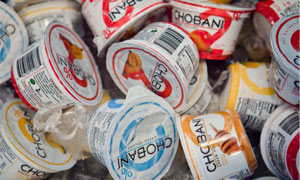Chobani Turns to Super Bowl Ad to Score With Yogurt Lovers
 NEW YORK — Chobani says it will air its first Super Bowl ad this February, an effort to make the Greek-yogurt company more of a household name. The debut on advertising’s biggest stage comes as Greek yogurt continues to surge in popularity. Known for its thick texture and tart taste, Greek yogurt accounts for more than a third of the U.S. yogurt market, up from just 1 percent in 2007, according to a Bernstein Research report. The figure is expected to top 50 percent in coming years. Chobani is the market leader but says only about a third of Americans are familiar with its brand.
NEW YORK — Chobani says it will air its first Super Bowl ad this February, an effort to make the Greek-yogurt company more of a household name. The debut on advertising’s biggest stage comes as Greek yogurt continues to surge in popularity. Known for its thick texture and tart taste, Greek yogurt accounts for more than a third of the U.S. yogurt market, up from just 1 percent in 2007, according to a Bernstein Research report. The figure is expected to top 50 percent in coming years. Chobani is the market leader but says only about a third of Americans are familiar with its brand. To boost awareness, the company hired Peter McGuinness as its first chief marketing officer four months ago. McGuinness declined to provide details on the Super Bowl ad but said it would be more than 30 seconds and mark the start of a more aggressive marketing strategy.
According to Kantar Media, a 30-second ad in the Super Bowl cost $3.5 million last year.
The timing of the push isn’t coincidental.
The new year is seen as a time when people are looking to improve their diets, and part of the success of Greek yogurt has been its nutritional attributes, such as its higher protein content.
This week, Chobani is also rolling out a line of 100-calorie cups, marking a late entry into a critical segment of the yogurt market.
“This is a consumer we’ve been missing for the last six years,” CEO Hamdi Ulukaya conceded during an interview at the company’s New York City offices.
The rollout comes as Chobani faces growing competition from major players, particularly in the lower-calorie segment that targets dieters.
Dannon, for instance, offers a Greek version of its popular Light & Fit yogurt that’s just 80 calories. The company is also advertising its Oikos Greek yogurt brand for the second time in the Super Bowl this year.
And last summer, General Mills introduced 100-calorie versions of its Yoplait Greek. The Minneapolis-based company had been blindsided by the rapid growth of Greek yogurt in recent years, with Yoplait suffering declines in sales volume.
But the company is racing to catch up, noting that its 100-calorie options distinguish it from competitors.
The “100-calorie” labeling is seen as an important psychological selling point, with many dieters unwilling to settle for products that come in even slightly above that figure. Many of Chobani’s 6-ounce cups, for instance, are 130 or 140 calories.
Despite its late start, Chobani notes it will be first to use only natural sweeteners in 100-calorie Greek yogurt cups. In addition to sugar, the company is using a mix of stevia, monk fruit and chicory root, which also adds fiber.
Ulukaya said Chobani didn’t do much consumer testing for the 100-calorie cups beyond employees and family, though stevia is known to have a bitter aftertaste that food makers have found hard to mask.
“When it’s good, it’s good,” Ulukaya said, noting that the sweetener blend was intended to balance out stevia’s taste.
Still, McGuinness seemed to acknowledge that the popularity of Greek yogurt will mean stiffer competition for Chobani more broadly in coming years.
General Mills, for example, recently said its share of the market had reached about 9 percent. And executives have said they plan to bring that figure up to 20 percent.
“The sleeping giants have woken up,” McGuinness said. (By CANDICE CHOI, The Associated Press)
Last modified onSaturday, 06 May 2017 10:07
Latest from Admin TOA
- World Energy Council Türkiye Holds the Opening Meeting of the Young Energy Leaders (YEL’26) Program
- The Shared Pulse by Eda Uzunkara
- NEO HUMAN 10.0: How Will the Future Be Shaped? (Filiz Dag)
- Calculatit.net Is Bringing Pricing Transparency to America’s Construction Industry
- Support Independent, Trustworthy Journalism








